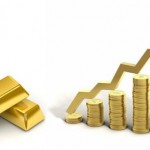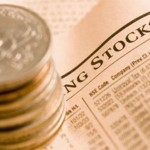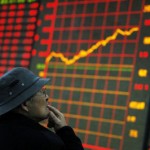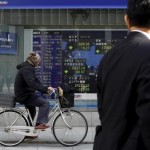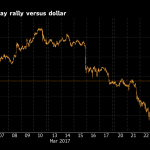Stocks Drop With Ruble as Ukraine Tension Spurs Gold

Global stocks dropped a third day, the ruble tumbled and oil and gold advanced as the U.S. and Russia traded barbs in the United Nations Security Council amid worsening violence in Ukraine. The euro dropped on prospects for more European Central Bank stimulus.
The MSCI All Country World Index dropped 0.2 percent by 8:20 a.m. in London. Gold climbed as high as $1,329.92 an ounce and crude in New York rose 0.7 percent. The ruble plunged 1 percent while palladium, of which Russia is the biggest producer, touched the highest since August 2011 after clashes between Ukrainian forces and pro-Russian gunmen turned deadly. Futures on the Standard & Poor’s 500 Index were little changed and Treasuries rose. The euro fell 0.3 percent to the dollar.
Russia called an emergency meeting of the UN Security Council as officials from the U.S. and Moscow blamed each other for violence that left at least one Ukrainian serviceman dead. ECB President Mario Draghi said the euro’s strength warrants more monetary stimulus. Citigroup Inc. (C) reports earnings today after disappointing results from JPMorgan Chase & Co. and a selloff in technology stocks sent the S&P 500 (SPX) to its biggest weekly loss since June 2012.
“The Ukraine tension is giving things linked to Russia a sentiment boost but this remains more of a tail risk, especially as many commodities already have their own existing supply story,” Dominic Schnider, head of commodities research at UBS AG’s wealth-management unit, said by phone from Singapore. “Equities have come off a fair bit and we have seen low correlations with commodities. Some allocators of capital seem to find that becoming attractive.”
Irreversible Turn
U.S. and Ukrainian officials accused Russia of being behind the violence as Russia’s UN Ambassador Vitaly Churkin said U.S. Vice-President Joe Biden should intervene to halt aggression by the government in Kiev or things may take an “irreversible turn for worse” within hours.
Materials and telecommunications-services firms had the biggest drops among the 10 industries on MSCI’s global equity gauge. A measure of technology firms in the Stoxx Europe 600 Index fell the most today among 19 industries, extending a global rout in the sector that’s been among the best performers since the global financial crisis.
Gold climbed 0.6 percent after touching the highest price since March 24. Palladium rose as high as $815.10 an ounce, the priciest since August 2011, while platinum increased 0.5 percent. West Texas Intermediate crude traded at $104.42 a barrel, a closing level not seen since March 3, and brent climbed 0.7 percent in London.
Wheat jumped 2.1 percent and corn advanced 0.6 percent. Ukraine is the world’s sixth biggest exporter of wheat and Russia is the fifth largest.
Nickel Rally
Nickel advanced for an 11th day, the longest streak since October 2010, rising to the highest level since February 2013 as Ukraine tensions exacerbated supply concerns from Indonesia’s ban on unprocessed ore exports. The metal for delivery in three months on the London Metal Exchange climbed as much as 2.5 percent to $17,839 a metric ton. Russia is home to OAO GMK Norilsk Nickel, the world’s biggest producer of the refined metal.
Russia’s ruble plunged to 35.9945 to the greenback and slipped 0.6 percent to 49.8375 versus the euro. The Micex Index fell 1.1 percent in Moscow, taking its loss this year beyond 10 percent.
Ukraine’s hryvnia fell 3 percent toward a record low close of 13.09 to the dollar. The currency’s decline is a result of speculation and the country will shortly receive the first tranche of International Monetary Fund assistance, central bank Governor Stepan Kubiv said in an interview in Washington.
Lira, Treasuries
Poland’s zloty slid 0.5 percent to 3.0249 versus the dollar after the country’s central bank chief said rates were at an appropriate level. Hungary’s forint declined 0.5 percent and Turkey’s lira dropped 0.7 percent.
Benchmark U.S. 10-year yields fell one basis point, or 0.01 percentage point, to 2.62 percent, according to Bloomberg Bond Trader prices. The yield was as low as 2.60 percent, a level not seen since March 3.
The ECB is considering whether to introduce more stimulus, including quantitative easing, after inflation in the 18-nation euro area dropped to 0.5 percent in March, the lowest level in more than four years, and the euro appreciated 6 percent versus the dollar over the past year.
“The strengthening of the exchange rate requires further monetary stimulus,” Draghi told reporters in Washington April 12. “That’s an important dimension for our price stability.”
The ECB will probably act to ease monetary policy within two months, respondents to a Bloomberg survey said. The euro fell to $1.3844 and bought 140.67 yen.
Asia Stocks
About five stocks fell for every three that rose on the MSCI Asia Pacific Index, which is down 2.8 percent this year. Materials producers and financial companies were the biggest drags on the regional index today.
Hong Kong’s Hang Seng Index was little changed. Japan’s Topix index slipped 0.1 percent. Australia’s S&P/ASX 200 slumped 1.3 percent and the Shanghai Composite Index closed little changed.
U.S. companies in which hedge funds own the most shares have fallen about twice as fast as the overall market since April 2, when the S&P 500 reached a record high of 1,890.90, according to data compiled by Bloomberg. The 10 S&P 500 stocks that are most popular among the speculators have fallen 7.5 percent since April 2, compared with a 4 percent drop for the U.S. equity gauge.
Correction Coming
“Our view remains that a 10 to 15 percent correction in shares is to be expected at some point along the way this year,” said Shane Oliver, who helps oversee about $130 billion as Sydney-based head of investment strategy at AMP Capital Investors Ltd. “But it would be just a correction in a still rising trend. Any such dip should be seen as a buying opportunity.”
The Nasdaq Composite Index last week capped its worst week since 2012 amid concern valuations have climbed too high as earnings season starts. The S&P 500 fell 2.7 percent last week. JPMorgan declined 7.5 percent for the five days ended April 11, the most since May 2012, as profit fell.
Bears burned by rising equities cut wagers against computer and software makers by more than half in the past five years. Short interest on technology firms in the S&P 500 averages 2.4 percent, near the lowest level since at least 2006, according to data compiled by Bloomberg and Markit, a London-based provider of financial data. That’s down from 5.6 percent at the bear market’s bottom in March 2009.
The lack of short-sellers is contributing to conditions that have kept stocks from rebounding, according to Rick Bensignor, head of trading strategy at Wells Fargo Securities in New York. In the past year, rallies have picked up speed as bears decided to buy back stock they’d borrowed and sold, a process known as short covering.
Source: bloomberg









